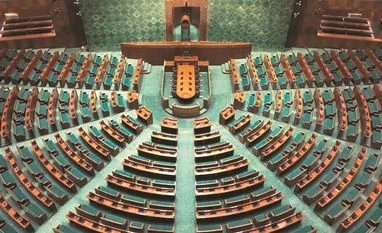On a charged Tuesday in both Houses of Parliament, the Samajwadi Party’s Akhilesh Yadav and the Congress' Digvijaya Singh led the Opposition in voicing scepticism about electronic voting machines (EVMs) and questioning the conduct of the Election Commission during the recent Lok Sabha elections.
The first session of the 18th Lok Sabha was adjourned sine die on Tuesday after passage of the Motion of Thanks on the President's address to the joint sitting of both Houses of Parliament.
The Opposition seized the debate on the Motion of Thanks to the President's address as a platform to confront the government on a spectrum of issues, from recent exam paper leaks and the Agnipath scheme to the strife in Manipur and livelihood challenges like inflation and unemployment.
In the Lok Sabha, Yadav, the chief of the Samajwadi Party, declared that he would EVMs even in the hypothetical scenario of his party winning all 80 seats in Uttar Pradesh. He asserted that the INDIA bloc, should it ascend to power at the Centre, would abolish EVMs altogether. “I did not trust EVMs yesterday, I don't trust EVMs today. And even if I win all 80 seats, I will not trust EVMs,” he proclaimed.
The SP clinched 37 of 80 Lok Sabha seats in UP in the recent polls, outperforming the BJP securing 33 seats in the state. This made the SP the third-largest party in the Lok Sabha, trailing only the BJP and the Congress.
Yadav obliquely criticised the Election Commission, stating, “When the Model Code of Conduct was enforced, the government and the commission were favouring some people. I do not want to go into details. Somewhere, a question has been raised about that institution as well.” He promised that the INDIA bloc, if it forms government at the Centre, would dismantle the Agnipath scheme and highlighted the reasons for the BJP's loss of the Ayodhya (Faizabad) Lok Sabha seat.
More From This Section
Lok Sabha Speaker Om Birla later cautioned against questioning the impartiality of the Election Commission.
In the Rajya Sabha, Congress's Digvijaya Singh echoed similar sentiments, accusing the Election Commission of partiality and challenging the credibility of the EVMs.
Alongside Singh, Aam Aadmi Party’s Raghav Chadha, SP’s Ram Gopal Yadav, and others interrogated the government on the alleged exam paper leaks.
In a poignant speech late Monday night, A Bimol Akoijam, the first-time Congress member from Inner Manipur, expressed his anguish over the omission of any reference to the ethnic violence in Manipur in President Droupadi Murmu's address to the joint session of Parliament. Akoijam, a professor at New Delhi's Jawaharlal Nehru University, was the final speaker in the Lok Sabha on Monday, delivering his remarks close to midnight.
“The hurt, the anger has thrown a nobody like me to be part of this temple of democracy, beating the BJP cabinet minister. Think about the pain. I will keep quiet the moment the Prime Minister opens his mouth and the nationalist party says that Manipur is a part of India and we care for the people of that state,” said Akoijam, who defeated Union minister Rajkumar Ranjan Singh in the recent elections.
Opposition members also scrutinised the BJP’s defeat in Faizabad, with SP’s Awadesh Prasad, who won from the constituency encompassing Ayodhya, lamenting lack of mention of Ayodhya in the President's speech. Prasad criticised the deplorable conditions faced by devotees en route to the Ram temple. Azad Samaj Party (Kanshi Ram) leader Chandrashekhar, representing UP’s Nagina in the Lok Sabha, called for a caste census and the reinstatement of the old pension scheme, a demand echoed by Yadav.
Trinamool Congress member Kalyan Banerjee observed that the recent Lok Sabha elections heralded a significant shift, yielding “an unstable government and a strong Opposition”. He remarked that the prime minister now relies on the support of Chandrababu Naidu's Telugu Desam Party and Nitish Kumar's Janata Dal (United) to sustain the government. Congress leader K C Venugopal suggested that the President’s mention of a “stable” and “complete majority” government was a reflection of its underlying insecurity.
)